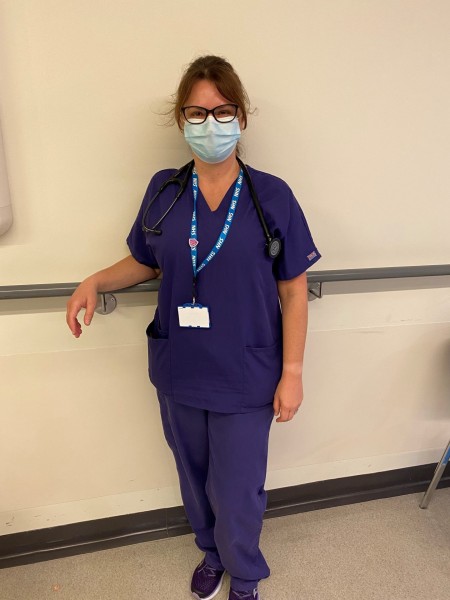Publish date: 15 September 2021
Sally Gibson explains more about her experience in a relatively new and often misunderstood role in the NHS

I’ve been a nurse for more than 25 years and have always been really excited about learning new skills and accumulating more knowledge to help patients.
I’m currently working towards becoming an Advanced clinical practitioner (ACP) which means that I’ll be educated to master’s level and be able to make clinical decisions and judgments as part of the wider medical team.
You can find out more about the role on the Health Education England website here, and in Northumbria, we are currently rolling out ACPs to all specialties within the organisation. You might spot us around the hospital wards in our grape coloured scrubs.
As a nurse, I’ve always been interested in the treatment of disease or injury and understanding how I can get more involved in the medical aspect of a patient’s recovery. I completed a BSc Nurse Practitioner award and prescribing qualification in 2007 which enabled me to assess, diagnose and treat patients. This gave me an excellent framework to begin developing my clinical decision-making skills when I started my Advanced Clinical Practice MSc in 2019.
This whole process has helped in opening my scope of practice in different settings and is also very rewarding.
Assessing patients, diagnosing them and then starting their treatment plans are satisfying to me, good for patients and vital for the NHS. The senior medical team are excellent at providing teaching opportunities and while this has been – at times – very stressful it’s still a really enjoyable and informative learning curve.
I work in the Ambulatory Care unit at The Northumbria hospital which provides same-day emergency service and treatment for patients who would historically have been admitted to hospital.
Patients with a medical or surgical need who may not need a stay in hospital are streamed to us from A&E, GPs and some other areas for a same-day investigation or treatment. My role involves assessing, diagnosing, treating and referring patients to the appropriate service.
I also perform clinical procedures that would have typically been performed by a doctor in the past which frees up the senior clinical team to concentrate on more seriously ill patients and oversee the unit. I also support the education of all the nurse practitioners on the unit and work to continually improve the service and patient journey.
One of the biggest challenges is that the role is not universally understood or respected at present – ACPs are not there to replace the medical team but to help shoulder the burden of the huge demand for NHS services.
Because of the pandemic, the number of patients being assessed by ambulatory care has increased massively and this model of streaming is here to stay. Although at times this can be stressful due to the large number of patients to assess, knowing these patients have received the best treatment the same day is extremely fulfilling.
